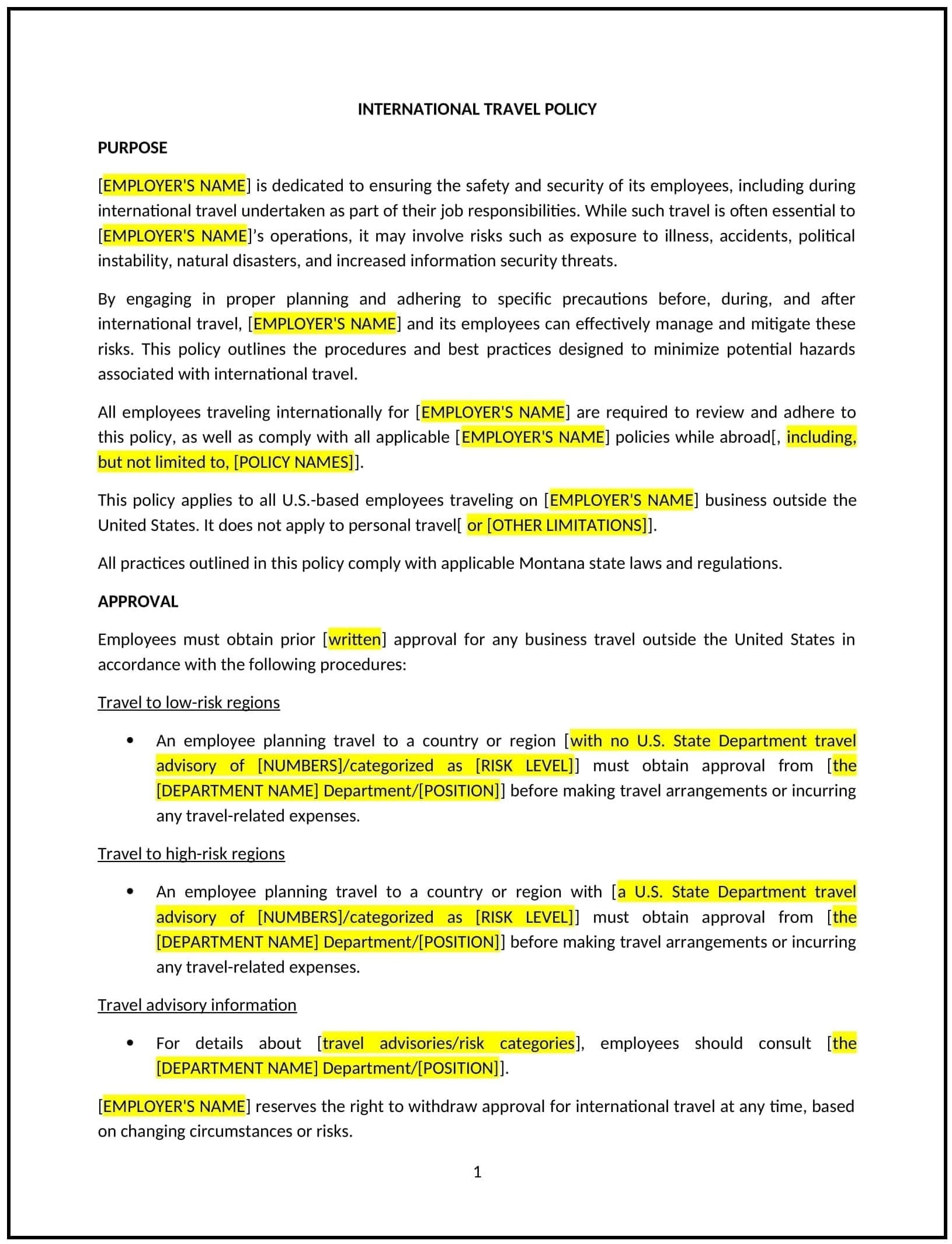International travel policy (Montana): Free template
Got contracts to review? While you're here for policies, let Cobrief make contract review effortless—start your free review now.

Customize this template for free
International travel policy (Montana)
An international travel policy helps Montana businesses manage employee travel abroad by setting clear guidelines for booking, expenses, health and safety, and travel insurance. This policy outlines the company’s expectations for employees traveling internationally, including procedures for obtaining approvals, covering costs, and ensuring employee well-being while abroad.
By implementing this policy, businesses can reduce travel-related risks, control costs, and ensure the safety and productivity of employees during international business trips.
How to use this international travel policy (Montana)
- Define the purpose of international travel: The policy should clarify the types of travel that are authorized for business purposes, such as client meetings, conferences, training, or site visits, and outline the process for obtaining approval for travel.
- Set guidelines for booking travel: The policy should specify how travel should be booked, including approved travel agencies, online platforms, or internal systems for arranging flights, accommodations, and ground transportation.
- Outline expense guidelines: The policy should define what expenses will be reimbursed, such as airfare, lodging, meals, transportation, and incidental expenses, as well as any daily per diem rates or limits.
- Address safety and health considerations: The policy should include provisions for ensuring the safety and health of employees traveling internationally, including obtaining necessary vaccinations, reviewing travel advisories, and providing emergency contact information.
- Provide travel insurance guidelines: The policy should specify the travel insurance requirements for international trips, including coverage for health emergencies, lost luggage, trip cancellation, or other unexpected events.
- Outline reporting and communication expectations: The policy should establish guidelines for staying in contact with employees during their travels, including regular check-ins, emergency protocols, and how to report issues or incidents while abroad.
- Review and update regularly: The policy should be reviewed periodically to ensure it is up-to-date with changes in regulations, travel practices, and company needs.
Benefits of using this international travel policy (Montana)
This policy provides several key benefits for Montana businesses:
- Improves employee safety: A clear travel policy ensures employees are informed about safety precautions and have access to necessary resources and emergency contacts while traveling abroad.
- Controls travel costs: By setting clear guidelines for travel bookings, expenses, and reimbursement procedures, businesses can better manage travel budgets and avoid excessive or unnecessary costs.
- Enhances efficiency: Standardizing travel procedures helps streamline the booking process, reduce delays, and ensure employees are well-prepared for their international business trips.
- Reduces liability risks: A comprehensive policy helps mitigate risks associated with international travel, such as accidents, medical emergencies, or lost property, by ensuring employees have the appropriate coverage and support.
- Promotes consistency and fairness: The policy ensures that all employees are treated equally when it comes to travel arrangements and reimbursements, fostering a sense of fairness and transparency.
- Strengthens reputation: Businesses that prioritize employee safety and responsible travel practices are more likely to gain respect and trust from employees, clients, and stakeholders.
Tips for using this international travel policy (Montana)
- Communicate the policy clearly: Ensure that all employees are aware of the international travel policy and understand the steps for booking, expense reporting, and safety guidelines when traveling abroad.
- Provide a streamlined approval process: Make the travel approval process as efficient as possible, ensuring that requests are reviewed and approved in a timely manner to avoid unnecessary delays in planning.
- Offer assistance with travel logistics: Provide employees with resources for booking flights, accommodations, and transportation, or designate a travel coordinator to assist with arrangements.
- Emphasize safety and health: Regularly remind employees to check for travel advisories, ensure they have appropriate vaccinations, and make necessary arrangements for health coverage while abroad.
- Encourage regular check-ins: Ensure employees traveling internationally stay in regular contact with their supervisor or HR to address any issues, provide updates, and ensure safety.
- Review and update the policy regularly: Regularly assess the international travel policy to ensure it reflects current travel trends, new legal or insurance requirements, and feedback from employees.